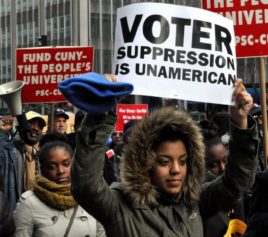Though much of the focus on the new voter laws has concentrated on their effects on African Americans, but a new study has concluded that the laws could keep 10 million Hispanics from voting in the November election.
The study was conducted by the civil rights group the Advancement Project, which found that 23 states have imposed new voting laws that could suppress the voter participation. Civil rights groups have accused the Republican-run legislatures in these states of imposing new rules to keep the number of votes cast by blacks and Latinos artificially low to help defeat President Obama.
“These obstacles could deter or prevent more than 10 million Latino citizens from registering and voting in the 2012 elections,” the report warned. “Like African-Americans, Latinos have experienced decreased access and correspondingly lower levels of voter registration and participation than non-Hispanic whites.”
As an example, the report said the number of Latinos potentially affected in Florida amounts to nine times the margin of victory in the state in the 2008 election.
Since Hispanics—the nation’s largest ethnic minority—currently favor President Obama by more than two to one over Mitt Romney, a dramatic decrease in the number of Hispanics able to vote in November could significantly hurt the president’s re-election chances, particularly if the election is close, as many observers expect.
New rules such as voter ID requirements are considered especially harmful to Latino turnout, since so many of them don’t vote anyway. The 2010 census showed that nearly 30 percent of eligible Latinos were not registered and more than half did not vote—compared to whites, who show 18 percent unregistered and 38 percent not voting.
Election experts agree that if most of the eligible Latinos and African Americans actually registered and voted, President Obama would win re-election in a landslide.
“Today we are witnessing the greatest assault on voting rights in over a (century), through a new wave of voting policies,” Project co-founder Penda Hair told reporters.

